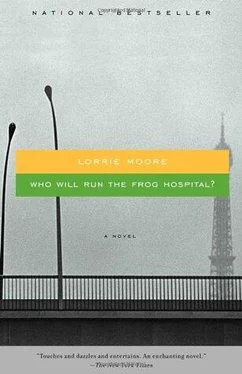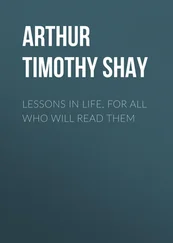“Well, we should get you baptized, then,” said Reverend Filo, as if he were a doctor and this were a perfunctory, snip-and-cut kind of surgery.
Somehow I didn’t think I’d be the only one who would be baptized that day, but I was. There were no robes. I wore my bathing suit and a blue linen cape tied in a knot at my throat. I stood with Reverend Filo in waist-high water, a few feet from the dock, little plastic buoys along the side, the lake warm and still and brown in the stagnant way of late summer. There were soft tall weeds growing up from the lake bottom, and they would do a charming kind of hula and then wind around your legs in a death grip.
On shore there was only my counselor, Sandy; Monica Hyde; and Hayden Filo, who smiled at me beneficently. Now I was truly taking his religion and could marry him. Perhaps that’s what was crossing his mind. It crossed mine.
“Do you, Benoîte-Marie Carr, accept Jesus as your Lord and Savior?”
These were vows. I summoned forth all the force and promise and devotion I knew I had within me. It formed a large dense mass beneath my ribs. My toes began to cramp and cross. I saw it now: There was only Jesus; everything else was nothing. Everything else was squat. The blue of the sky was endless and beckoning and true. There was Goodness. There was The Way. The mountains across the lake were the apostles, and the trees were witnesses descended from on high. The plastic buoys against the dock were the doves of the Holy Spirit.
“Yes,” I said, “I do.” Reverend Filo said something else, but I didn’t really hear. There were pains and spasms in my feet and legs, and then the Reverend’s arm came round the small of my back and he whispered, “Lean back, my dear.” I thought of my back dives, squinted my eyes and pushed off with my feet. But I pushed too hard, as if I were doing a real dive, and the leap back brought Reverend Filo staggering back with me. I opened my mouth wide for air, but water rushed in instead, and the weeds wound malignantly around my legs, paralyzing me. My arms clutched and thrashed. I had never been a good swimmer — I could dive but I couldn’t swim well; during Swimming at school, with its bathing suits color-coded to everyone’s bust size, I had pretended to have my period or else early in the morning I’d bang my finger with a hammer until it swelled and I could arrive at the nurse’s office, requesting a splint. So, now, half-drowning, and bringing a man of God down with me — his head floundering next to mine in the water — I was incapable of saving myself or anyone. My blue cape billowed out to one side of me, its knotted ties twisting and tightening around my neck. I waited for the Holy Spirit to enter me and reside in my heart in peace, take me forever. I opened my eyes underwater, where things were silent but full of motion, muddy shapes and bubbles. I looked up toward the sky and out for God, but all I saw up through the water was the bright storm on the sun, and then Sils in her tiara calling my name, and then, finally, the large looming figure of Frank Morenton, clutching my rope purse — so funny, with my purse! — and looking down from the clouds, which roiled gassily about his feet and ankles like large fuzzy slippers. He looked as if he were scouting out the place, visualizing a turnstile or two and some rides. There wasn’t anything that couldn’t use a turnstile! There wasn’t anything that couldn’t benefit and prosper from Mr. Amusement! Mr. Morenton, Mr. Morenton , I said underwater. I’m very sorry, Mr. Morenton . I was near a great and peaceful death. I felt my soul leave my body yet still retain the skills of the body, so that I could actually see myself leave, waving, floating off like a balloon.
And then I was lifted up, coughing, by Reverend Filo and my counselor, Sandy. “Dear girl!” exclaimed the Reverend, who was also coughing, his hair sopping. “You just lifted off like a rocket!”
I sat on the shore in my wet cape, and let the sand cake on it. I coughed some more and spit onto the beach. Monica Hyde placed towels around me, and Sandy went to get me a can of soda. Hayden Filo sat next to me, looking disappointed, looking as if that were the most graceless, foolish baptism he’d ever seen.
“Perhaps I can try it again sometime,” I croaked.
“Perhaps,” he said distantly.
“Let’s sing a song, shall we?” said Reverend Filo. And we joined hands in a circle and sang “Jesus Walked This Lonesome Valley.” When we got to the last “He had to walk it by himself,” Sandy arrived with the soda, and I stepped out of the circle and drank.
At the end of August, before I was sent to the Mount Brookfield School, my mother picked me up at camp to take me home. Getting ready to sit beside her in the car, I had a great desire to be good, a nice girl, like Monica Hyde. But it was when functioning from this desire that I felt most anxious and odd, for what I had was only a desire, not a knack. My mother did not hug me. She asked me if I had everything, and then we got in and stopped first at the nearest gas station, a Sinclair station, its bright green brontosaurus like some reptilian Baby Huey; a puffy, inverted dollar sign. She signaled to the attendant, who was on my side of the car, and as she did I noticed the swaying flesh beneath her bicep and the greenish, black-stubbled oval of her half-shaved underarm — like the prickly, peppery seeds of a tropical fruit. I had to try not to feel repelled by her. I had to remember not her frosty, scolding self, or all the sad, injured love between us, but her niceness, the bursts of energy and originality which she had sometimes bestowed upon me when I was little: sewing new, striped clothes for all my dolls, then arranging them around the room before I woke on Easter; the cakes and breads and frosting bowls she’d leave out for snacks; a dance she once did in my room one night, all by herself, when I was sick in bed and bored. The dance had ended with one of her feet propped on a chair, arms thrust skyward and held like that, her hands clutching two aluminum pie pans. She did have a sense of theater, of costume and set design, and she could make things out of nothing: hats out of rags, doormats out of bottle caps. There were times she fascinated me. But we had never been close, and it was hard for me, ever, to feel I knew her. To know something you had to be able to go inside and feel, then step outside and look, and then do that again: go inside, feel, then outside and look. You had to do it twice. That was knowledge. Two in a row. But with my mother I could only do it once. I’d do it once, the first time, then run.
“Do you feel you learned things at camp?” my mother asked suddenly, after she’d paid the station attendant and pulled away, down the road. She seemed anxious to exude something, some affection; she seemed possessed of some inarticulate goodwill — I could see it surging and flickering in her face, in a kind of confusion.
“Yes,” I said.
“Really? That’s good. What did you learn?”
What I’d learned at camp, from all the vesper readings, mostly, was that you didn’t give back to the same people who gave to you. “Let’s see,” I said, stalling. You didn’t give back to the same people at all. You gave to different people. And they, in turn, gave to someone else entirely. Not you. That was the sloppy economy of gift and love. But that was living as a Christian — a practical Christian, but a Christian nonetheless. This, I realized, my parents already understood. Though it was probably not what they’d hoped I’d learn. “I learned that God is eternal benevolence,” I said finally, a little breathlessly.
My mother looked at me with alarm, then became quiet, watching the road. For about forty miles she said nothing, and then suddenly she started in. “Your grandmother’s looking forward to seeing you,” she said.
Читать дальше












